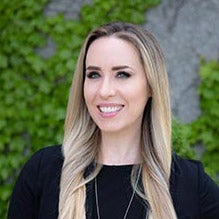
Naming and dismantling femmephobia
AMTD Global Talent Post-Doctoral Fellow Dr. Rhea Ashley Hoskin develops new research and tools to help people revalue femininity.

AMTD Global Talent Post-Doctoral Fellow Dr. Rhea Ashley Hoskin develops new research and tools to help people revalue femininity.
By Elizabeth Rogers Faculty of Arts
Dr. Rhea Ashley Hoskin
AMTD Global Talent Post-Doctoral Fellow
> Ontario Women’s Health Scholar
> Governor General Gold Medal Award (Queen’s University)
You might not have a name for it, but you’ve likely seen or experienced its impact. Femmephobia refers to the way society devalues and regulates femininity, or anything deemed feminine, whether expressed by women, nonbinary people or men. This insidious form of prejudice impacts everyone, regardless of gender or sexual orientation – but Dr. Rhea Ashley Hoskin aims to change all that.
“The way society devalues and regulates femininity is almost second nature. We tend to take it for granted that a man would be ridiculed or assaulted for being too feminine, or that someone wouldn’t be taken seriously at work if they wore an overly feminine dress,” says Hoskin. “But this is a prejudice and one that is deeply ingrained and naturalized in so many areas of life for so many people.”
Already an award-winning and well-published scholar, Hoskin joined Waterloo in 2020 as one of the first recipients of the AMTD Global Talent Postdoctoral Fellowship Program which supports disruptive research and knowledge sharing. Alongside mentors Dr. Toni Serafini (Department of Sexuality, Marriage, & Family Studies at St. Jerome’s University) and Dr. Andrea Quinlan (Department of Sociology and Legal Studies), Hoskin is deepening our understanding of femmephobia and creating ways for people to counteract it. Her work cuts across disciplines, including sociology and psychology, and explores femmephobia in multiple domains, such as discrimination, body image, health, relationships, pop culture, work, and gender-based violence.
“While at Waterloo, I have had the opportunity to continue exploring femmephobia across multiple domains, each of which has yielded striking results,” says Hoskin. “For instance, in one study we learned that many women across sexual identities experience intense pressure to be ‘less feminine’ in multiple areas of their lives – at home, while dating, at work, playing sports, etc. They frequently feel they have to alter their appearance or mannerisms.”
This finding is especially impactful in relation to previous research that focused on the pressure many women face to be more feminine. Together, the findings suggest women are trying to be the right amount of feminine and masculine at all times according to the demands of each context.
“This suppression of femininity and the balancing acts women perform come at a cost - you cannot move freely in the world when you are walking a perpetual tightrope,” says Hoskin.
Hoskin’s impressive scholarly outputs – including 38 papers, three books and numerous presentations – are helping other researchers use femmephobia as a lens in their own work. However, a crucial part of her work is getting her research into the community where it can help create meaningful change. One such collaboration is a free Femmephobia 101 Workbook which helps people examine and challenge their ideas and attitudes about femininity. Hoskin and her colleagues are already planning editions specifically for parents, youth and teenagers.
Hoskin is also working on a SSHRC-funded interactive digital platform that visualizes the impact of femmephobia on society and helps people to revalue femininity. The AMTD fellowship made it possible for her to hire a software engineering co-op student to help create this innovative experience.
“We want to help people imagine a world where femininity is treated equally and not so heavily regulated across bodies and identities,” Hoskin says. “Outreach is a central aspect of my research and values, so the AMTD’s focus on the betterment of society and knowledge mobilization was a big part of what drew me to this fellowship.”
“These inequities are the basis for so many types of harassment and violence across contexts such as families, schools, workplaces, and relationships,” says Serafini. “When we talk about innovation and disruption, people tend to think of science/technology. But Hoskin’s work disrupts the ideologies that perpetuate oppression and impact our daily living, identities, and relationships. This is the systemic disruption needed for social change.”
Through the support of the fellowship, Hoskin supervised graduate and undergraduate students, and is teaching a new course on Femme Theory at St. Jerome’s University. Hoskin sees both as integral to creating the “waves of disruption” sought after by the AMTD fellowship by helping the next generation of researchers approach questions of femininity differently. “It will create ripple effect as students move to different institutions and into various careers,” Hoskin says.
After her ATMD Fellowship concludes, Hoskin plans to stay with Waterloo and St. Jerome’s to continue her work through a SSHRC postdoctoral award. During her time at Waterloo, she also earned a SSHRC Insight Development Grant, where she ranked #1 out of 47 in her funding category.
“My AMTD fellowship has been the highlight of my career thus far and has shaped who I am as a researcher, mentor, and colleague,” says Hoskin. “The fellowship provided the stability and financial support for me to focus on moving the burgeoning field of femininities forward and to devote time to outreach activities and media engagements.”
“It has been an honour working with Drs. Serafini and Quinlan as an inaugural AMTD fellow, and I am filled with gratitude that I am able to continue working with them over the next couple of years.”

Read more
Meet the five exceptional graduate students taking the convocation stage as Class of 2024 valedictorians

Read more
The Government of Canada announces funding for discovery and applied research in engineering, natural sciences, health and social sciences

Read more
Meet the 13 exceptional students representing Waterloo’s newest grads
The University of Waterloo acknowledges that much of our work takes place on the traditional territory of the Neutral, Anishinaabeg, and Haudenosaunee peoples. Our main campus is situated on the Haldimand Tract, the land granted to the Six Nations that includes six miles on each side of the Grand River. Our active work toward reconciliation takes place across our campuses through research, learning, teaching, and community building, and is co-ordinated within the Office of Indigenous Relations.